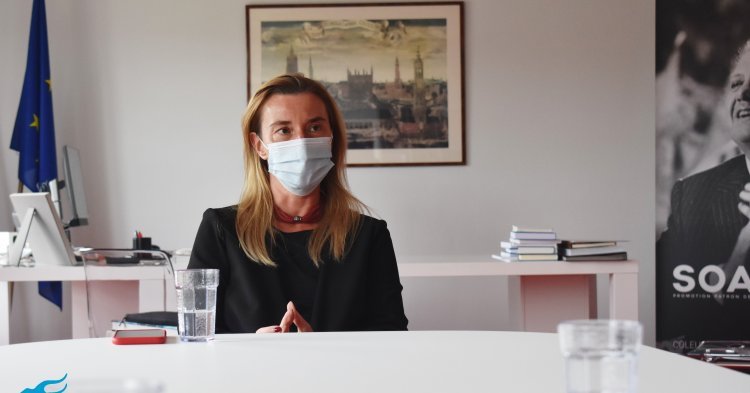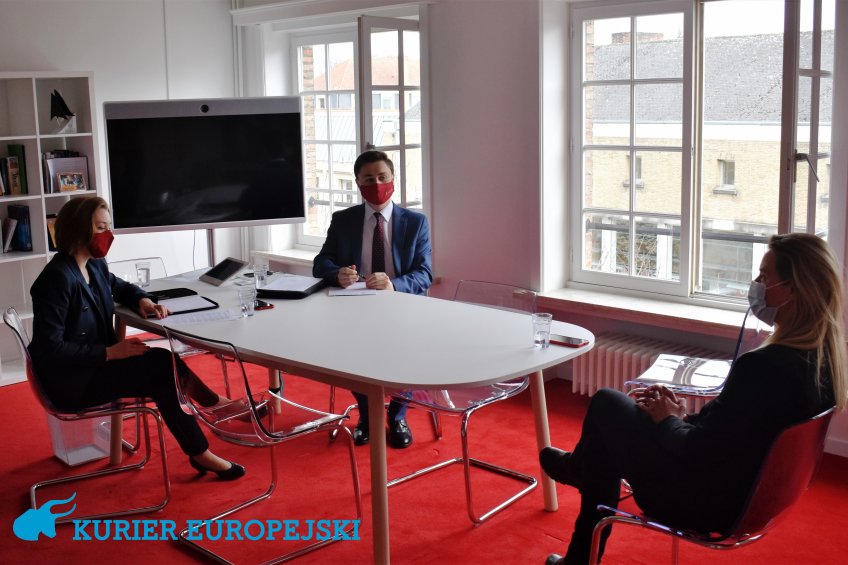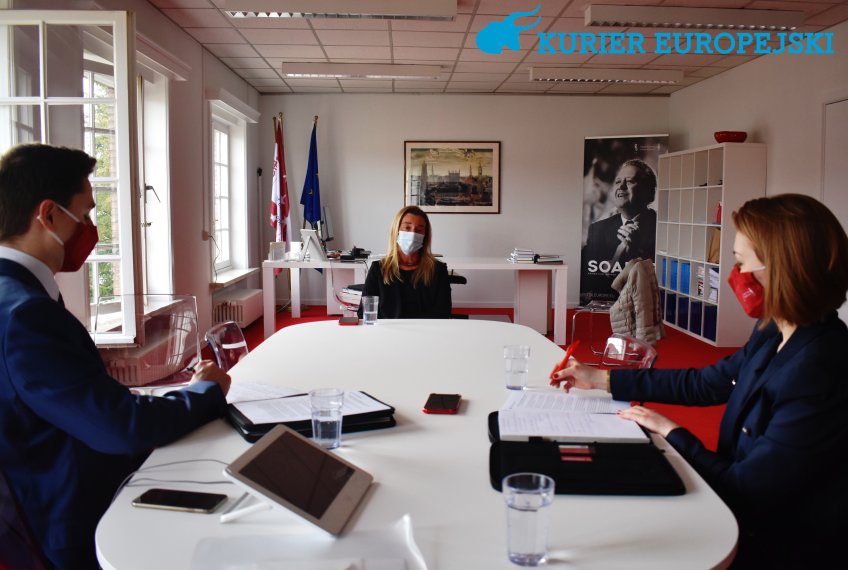Fryderyk Lachaise: Thank you very much, Madam Rector, for accepting to share with us your personal experience regarding the recent developments in the EU’s Eastern Partnership policy.
Thank you, I am glad to share them with you. I had the chance to visit all the Eastern Partnership countries, with the exception of Belarus – which I regret. But otherwise, I remember my term as a period of intense exchanges with officials from the Eastern Partnership countries, during which I gained some really interesting insights.
Maria Popczyk: To start with, we would like to ask you how you would evaluate the evolutions of the Eastern Partnership during the first decade of its existence. Do you think that the current EU’s involvement in Eastern Europe and Southern Caucasus is satisfactory?
First of all, I think that the Eastern Partnership policy overall has been a success. It is true that there have been some bumps on the road, but if you have a look at the developments in each of those six partner countries, their cooperation with the EU has definitely brought tangible economic development and job opportunities. It also contributed to strengthening the relations between the people on both sides, which is crucial for a fruitful cooperation. Therefore, I would definitely say that the Eastern Partnership in its present form is a great achievement.
Nonetheless, I am aware of the frustration experienced by the EU’s partners regarding the mismatch between the aspirations of some of them and the limits of what the EU can offer right now. Similarly, there have also been disappointments within the EU because of the lack of reforms in some Eastern Partnership countries as well as contradictions in some processes. All in all, however, this policy has been successful. Recently, in particular, it has been improved after the EU and its partners found a way to take a tailor-made approach. It allowed each of the Eastern Partnership countries to find its own way and to define the forms of cooperation which are the most interesting and sustainable for it.
F.L.: Speaking of the individual countries, we would like to follow up with a question concerning the aftermath of the last presidential elections in Belarus. Which lessons do think that the EU has learned in this context from the 2014 Ukrainian crisis? Have they been applied to the EU’s response to the Belarusian one?
What happened in 2014 was clearly a violation of the territorial sovereignty of Ukraine and of international law. First, we need to recognise and name the root of the crisis: Russia’s illegal actions, including the annexation of Crimea. This being said, and we have always been self-critical, I think that in the past there might have been a tendency from the EU side to present the Eastern Partnership in a too binary way, as a choice between political and economic cooperation with either the EU or Russia. This might have put too much pressure on some countries which remain in a close relationship with the Russian Federation.
A lesson learned has therefore been the need to develop a less exclusive approach. For instance, since about 2017, we continue to underline that the Eastern Partnership is not about imposing a choice, but rather about cooperation in fields such as economic reforms, trade, institutions, the rule of law and democracy. Every country is free to choose which direction it wants to take. Thus, we have moved towards a strategy based on national reform agendas and processes.
This was visible in the context of the recent events in Belarus, when the EU formulated a response focusing on the democratic standards of the country itself by underlying the need to respect the popular will, the standards of democracy and the rule of law. Never did the EU speak in terms of Belarus choosing the “geopolitical camp”. This is particularly important for a country which maintains very strong ties with Russia. It is also advantageous for civil society. In this regard, I remember very well what the Ukrainian Maidan looked like and what people there were saying: “we are fighting to change and modernise our country, to introduce anti-corruption reforms, and not to choose our camp”. Following that, the EU has learned that it should first and foremost foster the home-grown democratic movements in the Eastern Partnership countries.
M.P.: As you know, this magazine is affiliated to the Young European Federalists (JEF), an organisation which strongly supports European integration. This year, JEF celebrated the 15th anniversary of its campaign “Democracy under Pressure”, created to raise awareness about the Lukashenka regime. How do you think the EU could support civil society in Belarus?
That is an excellent question, because the case of Belarus shows perfectly the need to empower the domestic movements in the Eastern Partnership countries. Sometimes, when you sit in your office in Brussels, you have the impression that your support might endanger the credibility or the popularity of civil society. In fact, if the EU openly backs its members, those people might be labelled as the “agents” of the Union. Consequently, it is critical for the EU to support independent journalism and civil society movements, but only in a general manner. The Union should not impose anything, but rather provide them with the necessary tools to pursue their activities. In this regard, the network established between the civil society organisations and independent journalists across the Eastern Partnership states proves extremely valuable. Their cooperation lies entirely outside the powers of the EU which cannot be accused of directing or influencing them.
Another important aspect of the EU’s involvement in Belarus is related to public complaints: one should never forget about the individuals oppressed by their states’ authorities. On the contrary, those issues have to be raised during official talks and meetings at all levels. By doing so, the EU can signal that they do not go unnoticed. Thus, the EU may continue to effectively encourage civil society demanding reforms in countries such as Belarus.
F.L.: When it comes to the measures which the EU adopts in reaction to the negative developments in its Eastern neighbourhood, we would also like to ask about your opinion on economic sanctions. Last December, the European Council once again decided to extend EU sanctions against Russia related to the annexation of Crimea and the military conflict in Donbass. Do you think that these restrictive measures have been effective over the past seven years?
Although it is a difficult question, my first answer would be: I really do not think that the EU could have acted differently in this matter. The year 2014 probably marked the peak of political discussions in the Foreign Affairs Council, in particular when it comes to the decision on imposing sanctions on Russia after the annexation of Crimea and the invasion of Donbas. And if you think of the composition of that Council back then, you can easily imagine that the discussions were heated and very complex. We needed to decide what was the best reaction to adopt and what we had to exclude. I personally believe that the imposition of sanctions was the right thing to do, as it is the most effective power the EU can exercise on the international scene, namely: using economic pressure as well as coordinating other actors, be it the United States or its partners in Asia.
Not doing anything was not an option, neither was responding by military action. Proving unity by unanimously adopting sanctions, something that Putin definitely did not expect us to do, was a real victory for the EU which showed a clear political reaction and its ability to exercise pressure on Russia. The Russian economy suffered from those measures and although the impact of the sanctions on the political decision-making in Moscow remained limited, we do not know what could have happened in the absence of EU action. We should bear in mind that without the sanctions or the Minsk Agreements, even though they were not implemented, the conflict might have deteriorated even more.
What the EU really managed to achieve was therefore to balance economic sanctions with opening a channel of dialogue with Russia. Before the sanctions were adopted, Moscow perceived the EU as part of the Ukrainian crisis: back then, it was impossible to have an EU-Russia dialogue on Ukraine. It took some time to start this conversation. In 2017, I finally visited Moscow for the first time as the High Representative: this would not have been possible had the political dialogue not been reopened.
F.L.: Since Joe Biden became president of the US, the White House adopted a more assertive position vis-à-vis Russia, even qualifying president Putin as a “killer” with regard to the Navalny case. In your opinion, will the EU follow its transatlantic partner and adopt a more confrontational approach towards Moscow?
While US diplomacy tends to have more of a binary approach vis-à-vis Russia, we Europeans normally adopt a more differentiated, complex one. The same applies to our relations with China: the EU has defined it as a partner in certain issues, but a competitor or even a systemic rival in some other matters. It is a very pragmatic attitude since you cannot for instance tackle climate change without China’s involvement. I think Europeans will keep such a complex approach towards Russia saying that cooperation is possible and desirable in some areas, complicated – but requiring an open dialogue – in others and, finally, very difficult – and necessitating toughness – on matters such as Ukraine, human rights or the rule of law.
Another element we Europeans have much more than anybody else are people-to-people contacts with Russians. I have always been impressed by the number of Russian students doing Erasmus exchanges in EU countries. I think it is the best investment we can make because one day politics in Russia will evolve, so it is important to observe the development of Russian society. If you think of Ukraine in 2013-2014, the EU was about to sign an Association Agreement with a political leader who eventually turned into an opponent. However, it was an agreement with the country, not with its leader. I think that the EU is very good at managing its relations with the society. We do not only focus on political leadership and institutions, but we also look beyond that – at the civil society, the academia and the business environment.
M.P.: We have one final question related to the interviews we have previously conducted with young people coming from Eastern Partnership countries. The issue of differentiation emerged several times in our conversations. Do you think that the EU’s Eastern Partnership policy should make a distinction between the countries which have signed Association Agreements with the EU and those which have not? Or would such a differentiation make sense between those which made progress in terms of democratisation and those which remain authoritarian?
There already is a difference in practice. If you have signed an Association Agreement, you already enjoy a different status, a different institutional framework. In my opinion, however, it is extremely important not to create two different boxes. For instance, I have always refused the reference to ‘high aspirations’ – they are not higher for any country – they are simply different. In particular, Armenia and Azerbaijan are not less ambitious than the three Eastern Partnership states that have an Association Agreement. They simply want another kind of partnership, which is also ambitious in a way. The important thing is that the EU manages to define what fits better for each of these countries to respond to the needs of the society.
Having said that, it is also important to avoid creating such labels as ‘first class’ and ‘second class’ among the Eastern Partnership countries, because this might lead to a sort of politicisation of the issue. At a certain moment, the question of an Association Agreement with Moldova was politically manipulated, which did not make any good neither to that country nor the EU. When Moldova had a less Euro-enthusiastic President, many were arguing that the country should have a different treatment. I do not share this approach. Again, the partnership is with the countries, not with their political leaders; and if the political leader changes, this should not affect the country’s relations with the EU.
Therefore, I would keep the six Eastern Partnership countries in one box; also because you never know, such countries like Armenia, Azerbaijan or even Belarus might start running fast, or you could have steps back in one of the other three countries. I would be cautious with differentiating them. I know of the big frustration regarding the EU membership perspective, but I have always signalled that we have countries in the Western Balkans waiting for quite a long time, too.
The Eastern Partnership should unite and not divide the countries, because it is a really society-based approach. This is what can give continuity to the partnership. Domestic political shifts often happen, so if the partnership with the EU becomes part of party politics, then you are subject to shifts after every electoral circle. For me, the most important thing is that this agenda becomes a country agenda, not a political agenda. In this respect, de-linking it from a binary East-West, geopolitical approach is a way of taking that element of politicisation out.
M.P.: Madam Rector, thank you very much for sharing your insights on the Eastern Partnership with us. We hope that despite the current tensions in the region, the Eastern Partnership will continue to bear fruit thanks to its society-based approach you have just explained.
F.L.: We could not have concluded this series of conversations on this EU policy in a better way. We are therefore deeply grateful for your time and your support for our activities.






Follow the comments: |
|
